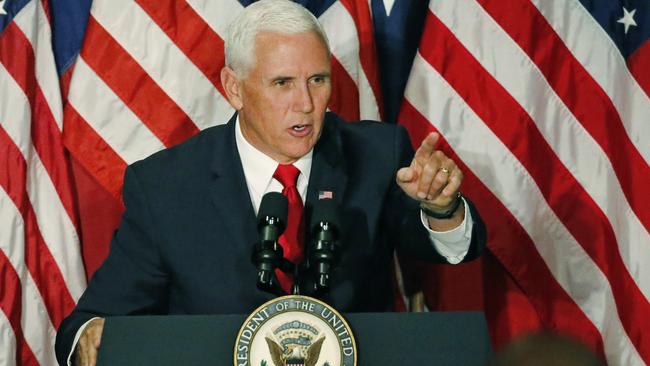Suppose Mike Pence started Cold War II and nobody noticed

Did Cold War II break out last week while no one was watching? As the Kavanaugh confirmation battle raged, many missed what looks like the biggest shift in US-China relations since Henry Kissinger’s 1971 visit to Beijing.
The Trump administration’s China policy swam into view, and it’s a humdinger. Vice-President Mike Pence gave a guide to the approach in a speech last week at the Hudson Institute. Denouncing what he called China’s “whole-of-government” approach to its rivalry with the US, Mr Pence vowed the Trump administration would respond in kind.
He denounced China’s suppression of Tibetans and Uighurs, its “Made in China 2025” plan for tech dominance, and its “debt diplomacy” through the Belt and Road initiative.
The speech sounded like something Ronald Reagan could have delivered against the Soviet Union: Mr Xi, tear down this wall! Mr Pence also detailed an integrated, cross-government strategy to counter what the administration considers Chinese military, economic, political and ideological aggression.
In the same week as the Vice-President’s speech, US Navy plans for greatly intensified patrols in and around Chinese-claimed waters in the South China Sea were leaked to the press. Moreover, the recently entered trilateral US-Mexico-Canada trade agreement was revealed to have a clause discouraging trade agreements between member countries and China. The administration indicated it would seek similar clauses in other trade agreements.
Also last week, congress approved the Build Act, a $US60 billion ($85bn) development-financing program designed to counter China’s BRI strategy in Africa and Asia. Finally, the White House issued a report highlighting the danger that foreign-based supply chains posed to US military capabilities in the event they were cut off during a conflict.
Any one of these steps would have rated banner headlines in normal times; in the Age of Trump, all of them together barely registered. But this is a major shift in US foreign policy.
As China responds, and as other countries formulate their approaches to the emerging US-China rivalry, a new international reality will take shape. With many longtime US allies opposed to the Trump administration on trade policy and other matters, and with Russia, North Korea and Iran all looking to frustrate US goals, an indignant China looking for opportunities to make Washington pay may find help.
American businesses engaged with China could face difficulties as the US strategy is implemented. US presidents have broad authority over trade and investment related to national security. Donald Trump has already used this to threaten and impose tariffs and Mr Pence has warned that even higher tariffs are on the way. The White House report highlighting supply-chain vulnerabilities could provide the basis for new, more far-reaching restrictions.
Business and investors may still be underestimating both the Trump administration’s determination to challenge China and the economic disruption that greater US-China tension can bring. To the longtime China hawks and trade hawks now driving US policy, national security matters more than economic friction, and many of the protestations from the American business community may fall on deaf ears. Both China and the US are likely to move quickly, unpredictably and disruptively; Wall Street should brace itself for further shocks.
In terms of domestic politics, the more confrontational policy is likely to be broadly popular. Mr Trump’s populist base resents the “theft” of American jobs, and human-rights and religious-freedom advocates are troubled by China’s severe repression at home and support for authoritarian regimes abroad.
The foreign-policy establishment may oppose Mr Trump’s tactics but it generally accepts the need for a stronger stance against China. Businesses will be split; while some are heavily exposed to a potential deterioration in US-China relations, others are angry about stolen intellectual property, resent restrictions on access to Chinese markets or fear competition from subsidised Chinese firms.
Democrats who have relished attacking Mr Trump for allegedly being soft on Vladimir Putin will have a hard time explaining why a hard line on Russia is a patriotic duty but a tough China policy is a mistake.
Replacing the North American Free-Trade Agreement, reshaping the Supreme Court and launching a new Cold War in the same week is quite the trifecta. The US may or may not be on the road to greatness under Mr Trump, but it is going somewhere, at an accelerating pace.
The Wall Street Journal



